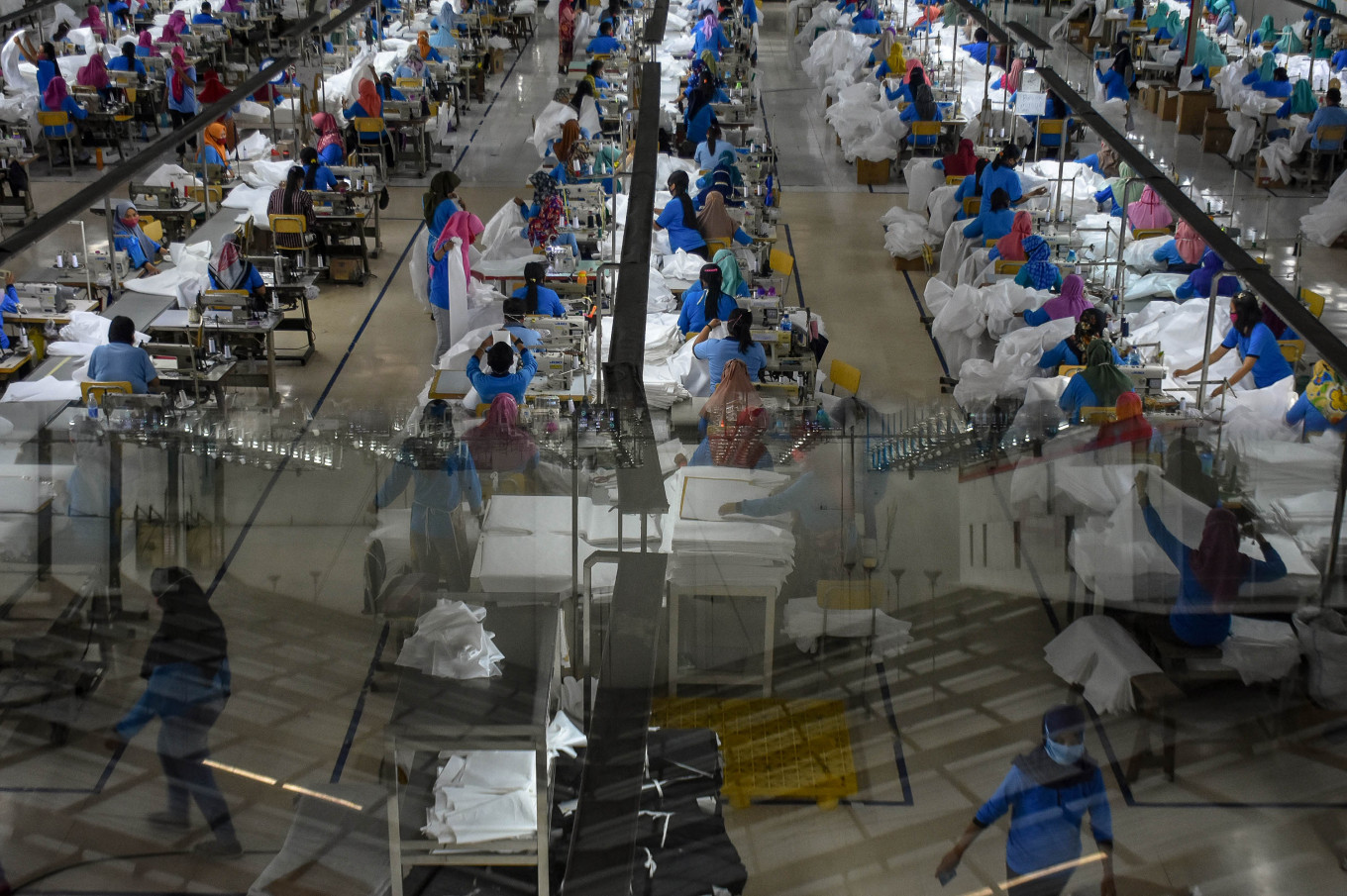Popular Reads
Top Results
Can't find what you're looking for?
View all search resultsPopular Reads
Top Results
Can't find what you're looking for?
View all search resultsIndonesia manufacturing improves, but risks remain
Indonesia’s manufacturing activity has shown signs of improvement for the first time since February, but risks remain as new COVID-19 clusters emerge in factories and industrial areas and as household spending remains weak.
Change text size
Gift Premium Articles
to Anyone
Indonesia’s manufacturing activity has shown signs of improvement for the first time since February, but risks remain as new COVID-19 clusters emerge in factories and industrial areas and as household spending remains weak.
IHS Markit’s Manufacturing Purchasing Managers’ Index (PMI) for Indonesia, a gauge of the country’s manufacturing activity, rose to 50.8 points in August from 46.9 a month before. A value above 50 indicates an expansion against the previous month, while a reading below 50 reflects a contraction.
“Indonesian manufacturers reported an improvement in business conditions for the first time since February, with output growing at the fastest rate for just over six years,” IHS Markit head economist Bernard Aw said in a statement on Tuesday.
The index had recorded its worst decline in the survey’s nine-year history and the steepest drop recorded in Asia when it fell to 27.7 in April from 45.3 in March as the COVID-19 containment measures forced factories to shut and caused unemployment to grow.
Aw said the higher PMI was driven by solid growth in both production volumes and new order inflows in August, as well as revived demand from the gradual reopening of the economy.
However, the rise in production has yet to lift factories’ capacity utilization to a level higher than before the pandemic struck, as manufacturers used stocks of goods to meet increased demand, resulting in further layoffs, albeit at an easing rate than in July.
“The concern is that the recovery stems primarily from the release of pent-up demand brought about by the lockdown measures and could falter after the initial rebound,” said Aw.
The rising unemployment, along with the need to maintain social distancing, might pose a threat to the sustainability of the slight expansion in manufacturing activities, he said.
Indonesia’s economy contracted 5.32 percent year-on-year (yoy) in the second quarter, the worst performance since 1999, as household spending, which accounted for more than 50 percent of the gross domestic product (GDP), shrank 5.51 percent yoy following the loss of millions of jobs.
Economists remain cautious, but most expect a further improvement of activity in September as the government lifts its pandemic restrictions in the hope to jack up the sluggish growth. They also project demand will grow over the Christmas and New Year season.
“Despite the rising number of new COVID-19 cases, [...] we believe that regional governments all over the country will not impose any stricter social-distancing measures,” Mirae Asset Sekuritas Indonesia economist Anthony Kevin wrote in a research note on Wednesday.
“One challenge that will continue to haunt Indonesia’s manufacturing activities, in our opinion, would stem from the inferior disbursement of government [funds], which will eventually depress purchasing power,” he added.
The government has disbursed only 26.4 percent of its pandemic stimulus package worth Rp 695.2 trillion (US$47.38 billion) as of mid-August, more than five months after the first infections announced in the country.
Another threat that might undermine an expansion of manufacturing activity is new COVID-19 clusters emerging in factories, Center of Reform on Economics (CORE) Indonesia executive director Mohammad Faisal told The Jakarta Post.
“If manufacturers are not careful, their factories could become a new COVID-19 clusters, which would force them to temporarily stop production,” he said over the phone on Tuesday.
At least 88 workers at a factory belonging to automotive spare part manufacturer PT Nippon Oilseal Kogyu in the Cikarang industrial zone of Bekasi, West Java, have contracted COVID-19, kompas.com reported on Monday.
The week before, the Bekasi administration announced 242 new infections at LG Electronics’ factory, while some 71 cases had also been reported by motorcycle manufacturer Suzuki in the same area in mid-August.
Consumer goods giant PT Unilever Indonesia had to temporarily close one of its factories in the Cikarang industrial zone in July after it found coronavirus infections. A similar move was also taken by Japanese industrial conglomerate Hitachi Ltd. in July.
Shinta Kamdani, the deputy chairwoman of the Indonesian Chamber of Commerce and Industry (Kadin), said outbreaks would cost manufacturers, as they would be forced to halt production for at least two weeks for disinfection purposes.
“It would also add cost to the already struggling manufacturers, as they would have to bear health costs to provide COVID-19 tests for employees,” she said.
Shinta stressed that expedited government spending and fiscal stimulus disbursement would help fuel demand in the last three months of the year, adding that the increase in demand would also depend on how the government handled the COVID-19 crisis and restored confidence in the domestic market.
“If the virus continues to ravage while the business and investment climate outlook is unchanged, the [government] spending will have no impact in boosting consumption, because it won’t create new jobs for the people,” said Shinta.










